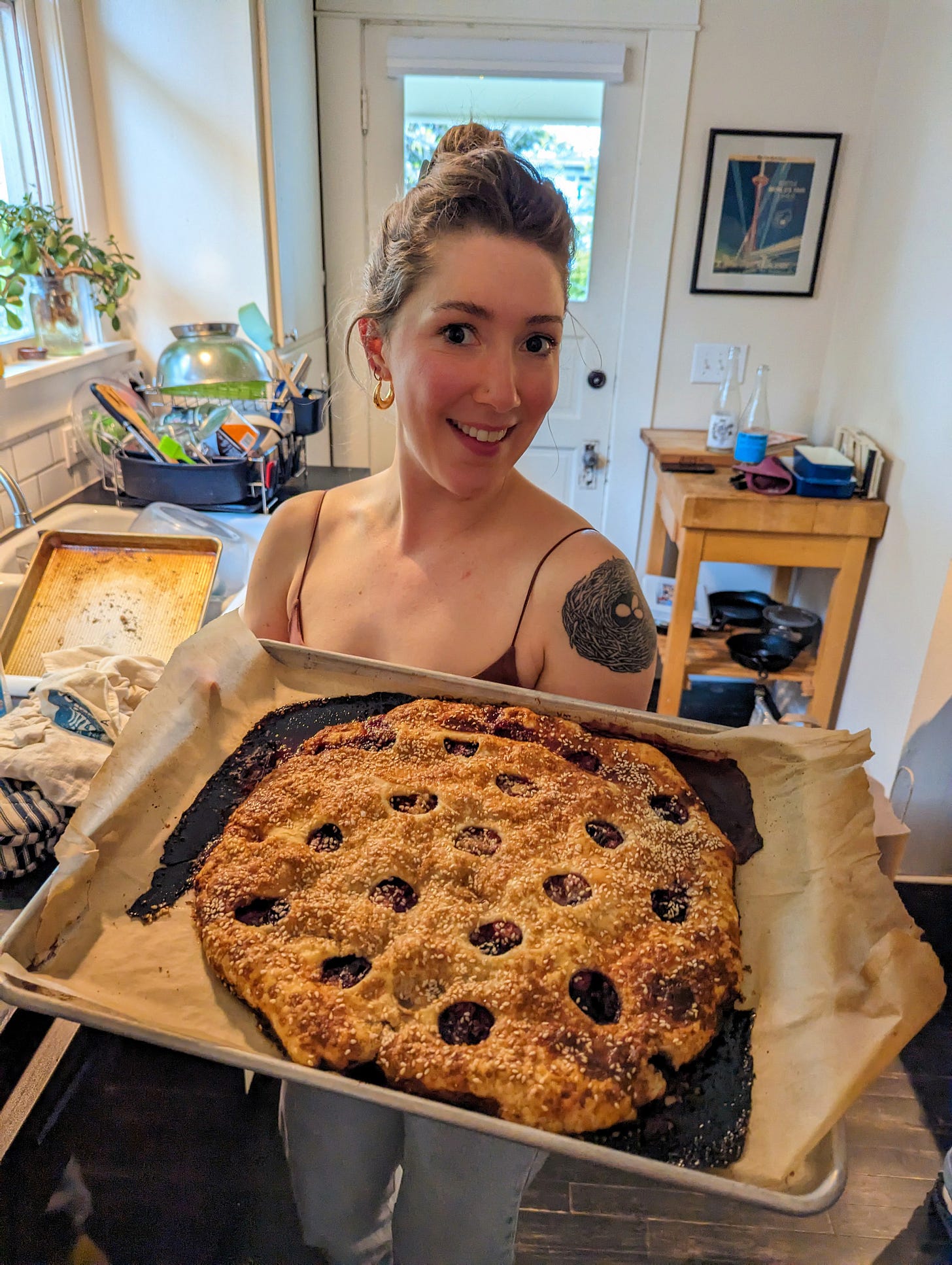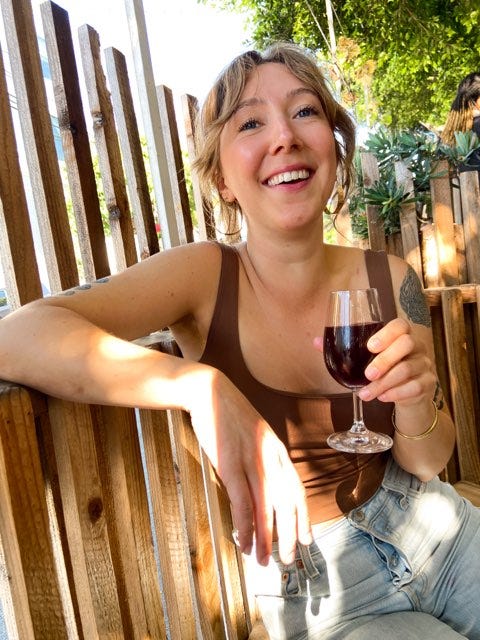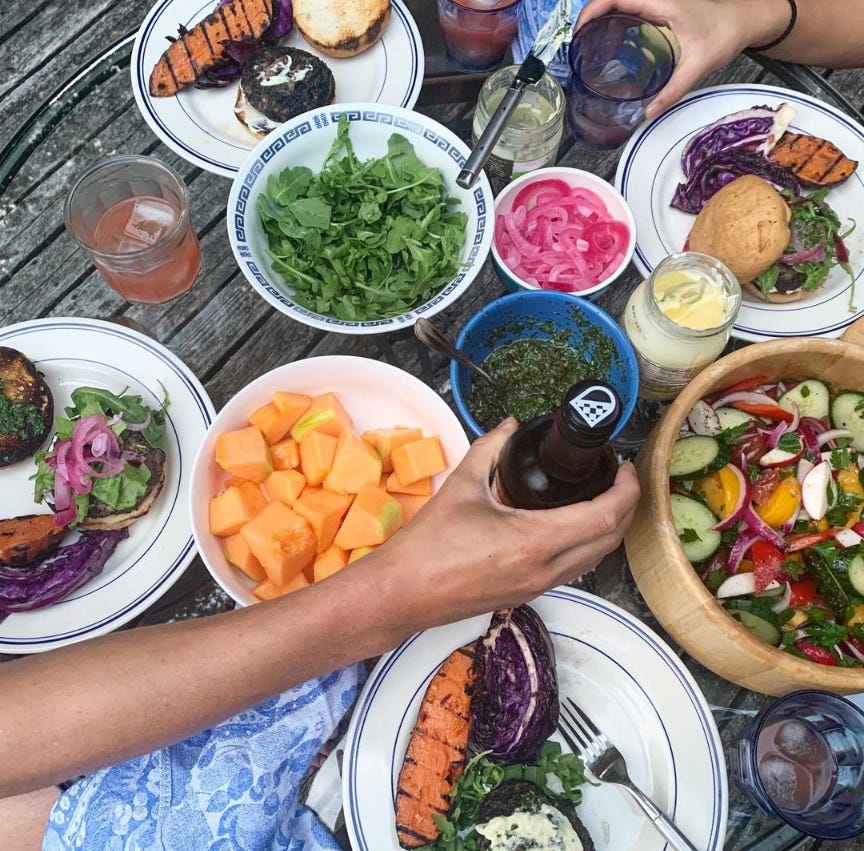Let's Play Galette Or Giant Pop-Tart with Chef Julie Dahlen - No. 25
And possibly the best "last day on Earth meal," I've ever heard.
Welcome to Just Peachy! If you haven’t already, please subscribe to receive a monthly smile—in the form of my newsletter hitting your inbox on the first Tuesday of each month. Go ahead, I’ll wait:
Included in each letter are sweet stories from women and non-binary people in food. These are chefs, restauranteurs, farmers, and creatives—all with unique, nerdy-passionate opinions to share.
Here we are. Somehow already one month into 2024. After a much-needed holiday at home in Seattle, and a beautiful trip to Colombia (who am I)—I am back in the kitchens of New York; refreshed, inspired, and clumsy.
Today I have the honor of sharing my interview with chef and registered dietitian, Julie Dahlen. Before I jump into it, I have to explain how special this interview is for me. Julie and I met sometime late in 2019 when she was working in the kitchen at Banter (formerly ANMLY), and beginning her Master’s in Nutrition. I remember meeting her again, later that following year at a party and feeling so impressed with her food knowledge. It was like she had a brain made of freshly rolled noodles, or braided babka—something swirly, fun, and delicious—that could explain the way she was able to store so many cooking, and entertainment facts. Now, I understand that this is simply the brain of a passionate cook. You see, Julie made me want to cook. She is a treasured friend, an unbelievably talented cook, and fearless mentor. SO! All women out there reading this…I promise you’ll feel the love in this one. She’s truly that special.
Who is Julie Dahlen
Food is central to Julie’s family. So much so, that it finds its way into nearly every childhood memory that she holds. Growing up in Olympia, Washington, Julie developed deep connections to the restaurants and cafes that her family frequented—her favorites of which have yet to be beat as an adult! Fond memories of breakfasts at the old Spar Diner, bathed in dark wood, spooky photographs, and cigarette smoke—Julie, hot chocolate in hand, would listen as the waitress who had worked there her entire life told her ghost stories. Or there was her mom’s favorite cafe, which they visited so often she could walk in and say, “The usual!” and receive the same sesame noodles and fruit cup without question. Then, of course, there was the German bakery with truly the best cinnamon bread, “complete with goopy end pieces, and equally as tantalizing apple turnovers that I still ask my mom to bring me whenever she visits.”
“Food has always, always, always been a part of my earliest childhood memories—drinking coffee through a sugar cube held between my teeth with my Papa”
A Scandinavian bunch, holidays with the Dahlens weren’t complete without lefse—a soft Norwegian flatbread—and endless bounties of Norwegian cookies. However, her food memories don’t stop at Olympia’s finest cafes or holiday cookies. “Honestly,” she tells me, “I could go on endlessly with memories like that, but my true love of food was fostered at home: drinking coffee through a sugar cube held between my teeth with my Papa, watching my dad bake using only a small, white ceramic mug to measure, or my grandma teaching me to make the perfect huckleberry pie, and reminding me that dessert is an every night kind of thing.”
When did you first discover your love of food?
Julie’s first industry job was in college at a noodle shop that served “luscious bowls of noodles with beef that had been slow cooked for hours in the most savory, umami-rich marinade.” She also recalls snacking on fried chicken skin crisps, and drooling over hot steam buns. Working with her best friend Dakota, she thinks back on this time and remembers laughing her ass off and carry giant, hot bowls of soup around the dining room. It was then that she was hooked.
After that, Julie found her first kitchen gig in Seattle, at a cafe called Juicebox (now closed) and worked her way up to sous. Juicebox was owned by women, run by women, and was the kind of space that just hummed with energy and community. She describes her time there as serendipitous. “It was exactly what I needed at the time and I was so fortunate to be elbow deep in the most beautiful local produce, making sauerkraut in the largest bowls I’ve ever seen, and running on the kind of energy that I feel like you only know about when you’ve worked a crushing shift—it’s exhilarating, it’s addictive.” Above all, her favorite part about cooking at Juicebox was the routine she’d created for herself when she opened the restaurant every morning.
“Putting on my clogs, getting my apron, cueing up the music, starting the espresso machine, making my fancy coffee, starting prep—I love the meditation behind it. My ‘temple duties’ if you will.”
How did cooking professionally impact your relationship with food?
Cooking professionally taught Julie it doesn’t take a lot to make beautiful and delicious food. “Some of the best dishes I’ve had are just seasoned with oil, lemon, and salt. Letting the actual food shine through, that’s key.” Also, she learned that taking care of others means taking care of yourself. Julie explains, “I had to make sure that I could eat! It’s so crazy that we cook all day for other people, yet it seems hardest to just feed ourselves.”
How did you transition to nutrition and what is some advice you find yourself always giving clients?
Just before the pandemic, Julie began her Master’s in Nutrition. As much as she loves the restaurant industry, she didn’t feel it would be her “forever job.” With so many closures and changes to the industry during the pandemic, the thought was solidified. (although…I know it wouldn’t take much to convince her to open a restaurant—with the right idea).
Tips from Julie, the Dietitian—
We can’t talk about balance until you are simply eating enough.
You really can include all foods.
Food and eating is much more nuanced than just food and eating. What I’ve realized most is that I’m lucky to love my relationship with food. It’s not easy for most of my clients.
There is no morality to food, no ‘good’ or ‘bad’ foods.
BUT! Society makes it so that it’s ok for some people to have the ‘bad’ foods and still be socially acceptable, while it’s not ok for others. There are societal consequences for some people because of this.
See? Nuance—there are so many more structures and systems at play that make ‘just eating’ so much more than just eating.
What do you do outside of cooking that inspires you?
Julie’s immediate answer? Eat. But don’t worry—she clarified that it is indeed, to eat. “I love to read, trail run, drink coffee and eat pastries in bed. I cuddle with my cats, garden…travel when I can.”
“It’s all about reading, eating and listening! My brain feels like a big ol’ sponge for this kind of stuff.”
Remember when I said Julie is the kind of person that knows everything about food? I asked her how she does it and what tips she may be able to share with us to remain inspired, retain information, and keep growing in the kitchen. Yes, Julie will read any cookbook she can find. On her counter right now are Alison Roman’s ‘Nothing Fancy,’ Molly Baz’s ‘Cook This Book,’ and Hetty Mckinnon’s ‘Tenderheart.’ However, she suggests simply going out to eat as the ultimate inspiration.
“You have to eat to feel inspired,” she tells me, and once you taste something you like, associate it with something else; a fact, a strong emotion, or a memory. Then that flavor combination, dish, wine, or cocktail—at least in her case—is stuck in her head forever. Then there’s where you sit when you go out to eat, Julie suggests sitting at the bar when you can to ask the bartender for their favorite spots. Finally, if she likes the restaurant, she’ll go on a deep dive into who they follow, “you know, who inspires them. Following the breadcrumbs…I’ve found some truly amazing spots that way.”
“The thing about food is that I feel it so deeply to my very bones. So much that it feels impossible to extricate myself and my memories from the food or dining experiences that surrounded them.”
Her final tip is one I made up for anyone who’s still in school. And that is to make your minor work for you. Julie built a minor in Eco-Gastronomy during her undergrad, which meant that she could travel to Italy to eat and study biodynamic farming; i.e. the slow food movement, foraging, and the like.
Julie. You’re a genius.
What are you making at home?
In a true cozy, winter fashion, Julie has been into roasting whole chickens lately. “There’s something so satisfying about throwing a lightly browned chicken into the oven with some aromatics. Maybe a squash. And a salad—of chicories and radicchio because I simply can’t get enough of those.” A recent all-out dinner was Eden Grinshpan’s lamb tagine with apricots, which she served with browned butter couscous and a chunky smashed Persian cucumber salad.
It’s your last day on Earth. What are you eating?
“Oh God, how do you choose?! My mom’s huckleberry pie and her macaroni and cheese. A chicory salad with lemon, really fucking tasty olive oil, and so much salt. A glass of champagne with oysters (Kumamotos), a fucking cold dirty martini (vodka) with 4 olives. Fries, warm sourdough with the richest butter I could find- it would be like, practically orange, those cows were just feasting on grass their entire life. And a glass of milk with a warm chocolate chip cookie!”
What would you love to do next in food?
Julie often daydreams about getting back in the kitchen (YEE! Come back!) Her ideas include “a little wine bar that feels like your favorite dive but with tasty, unique wines, fernet and would only serve Heineken. Or! A spot similar to Juicebox Cafe including beautiful fresh bowls, salads, fancy potions and drinks. A buzzing community.”
If you create it, I’ll certainly be a regular Julie! Follow along with her creations here; @juliedahlen_nutrition









